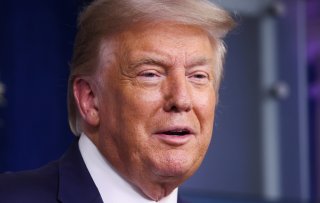Donald Trump and Democrats Hope to Reach a Deal on Coronavirus Talks By End of Week
President Donald Trump’s administration and Congressional Democrats agreed to reach a deal on the next coronavirus relief package by the end of this week and finalize a vote next week, but the targeted timeline may be stalled as Republicans remain strictly divided on a number of provisions.
President Donald Trump’s administration and Congressional Democrats agreed to reach a deal on the next coronavirus relief package by the end of this week and finalize a vote next week, but the targeted timeline may be stalled as Republicans remain strictly divided on a number of provisions.
The agreement comes after House Speaker Nancy Pelosi (D-Calif.), Senate Minority Leader Charles Schumer (D-N.Y.), Treasury Secretary Steven Mnuchin and White House Chief of Staff Mark Meadows met for a briefing Tuesday afternoon -- the same time Pelosi and Schumer noticed a gap within the Republican party.
“They're ... not unified. They admit that a large number of Republicans in the Senate will not vote for anything, and we do not know where Donald Trump is. He says a different thing every day, but we're still slogging through — step by step by step,” Schumer told reporters after the meeting.
The proposed timeline that the four officials agreed upon is perhaps the most bipartisan progress they’ve made since starting negotiations.
“We're not at the point of being close to a deal, but we did try to agree to set a timeline,” Mnuchin said. “We're going to try to reach an overall agreement, if we can get one, by the end of this week, so that legislation could then pass next week.“
“We agree that we want to have an agreement,” Pelosi said. “This takes time, and it takes specificity.”
White House officials also noted that the president is willing to negotiate a bill that omits the proposed liability shield -- which is a “red line” for Senate Majority Leader Mitch McConnell (R-Ky.) -- for businesses, schools and hospitals that would ensure liability protections for any coronavirus-related issues. Trump has also signaled having an open-mind to extending the $600 per week unemployment bonus that Senate Republicans have avidly opposed.
“Six hundred dollars a week — McConnell came out against it, Trump came out for it. Immunity [from] liability — a red line for McConnell, the president said, ‘Not one of our priorities,’” Senate Minority Whip Dick Durbin (D-Ill.) said, hinting that the Trump administration is more flexible than McConnell.
But, McConnell noted that he’s willing to settle without his “red line” provisions if both sides of the aisle can compromise.
“I am prepared to support, even if I have some problems with certain parts of it,” McConnell said.
Some Republicans, however, fear that the White House officials won’t be able to strongly persist against Democratic force and be more lenient with negotiations.
“The White House is trying to solve bad polling by agreeing to indefensibly bad debt,” Sen. Ben Sasse (R-Neb.) said.
“They’re seeing this and thinking, ‘This is good for us, you know. We’re putting pressure on Republicans without taking the heat ourselves,’” another GOP senator said
House Democrats proposed a $3.4 trillion package that was passed in May, a price tag that McConnell and other Senate Republicans have no interest in reaching. The Kentucky senator said he doesn’t want the bill to surpass $1 trillion.
“It’s not going to produce a ‘Kumbaya’ moment like we had in March or April where everybody voted aye, but the American people, in the end, need help,” McConnell said. “And wherever this thing settles between the president of the United States and his team who have to sign it into law and the Democrats’ not insignificant minority in the Senate and majority in the House, is something I’m prepared to support, even if I have some problems with certain parts of it.”
Rachel Bucchino is a reporter at the National Interest. Her work has appeared in The Washington Post, U.S. News & World Report and The Hill.

